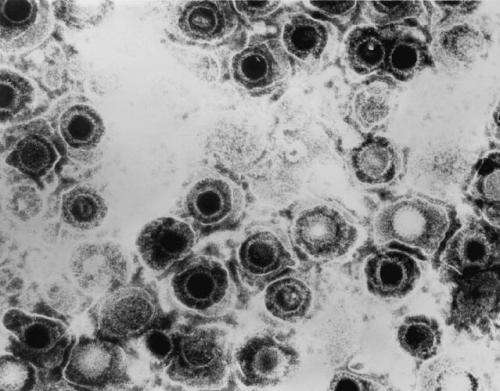Herpes virus found to promote chronic deterioration of the immune system

A research team at the University of Córdoba is studying the alterations that occur in the immune system's T lymphocytes with respect to age and in relation to the cytomegalovirus herpesvirus.
T lymphocytes are the cells of the immune system in charge of fending off viruses and cellular alterations produced in carcinogenic processes. They are capable of "remembering" and recognizing the "enemy" in a way that shortens their response times in the event of reinfections. The process of immune system deterioration with age is called immunosenescence. But the aging of the immune system, in addition to being chronological, may depend on other factors. One of them is, according to a study by a research team at the University of Córdoba and the city's Maimonides Institute for Biomedical Research (IMIBIC), the cytomegalovirus herpesvirus, capable of accelerating the decline of the immune system, regardless of age.
Cytomegalovirus(CMV) is a very common herpes virus, with a very high prevalence that increases with age, but it does not generate any type of symptoms. Like cold sores, CMV occasionally reactivates, and the immune system rebuilds a memory against it. "This virus, unlike others, has a strong impact on the immune system. It wears it down considerably, since it generates a lot of memory, as it has to be constantly watched for," the researcher added.
The research group, led by Prof. Solana, together with EmergentResearcher Dr. Alejandra Pera and Fakhri Hassouneh, has spent years analyzing whether the alterations and deterioration of the immune system are due to age, or to cytomegalovirus. In their latest studies they analyzed healthy individuals in three age classes (young, middle-aged and older); 119 people in all, organizing them into two groups: infected and not infected with CMV. The selection of healthy donors for the study was done through health centers, university and hospital staff, and UCO students, as well as donors from a collection of healthy German individuals. During Hassouneh's predoctoral stay the group collaborated with the research team of Professor Graham Pawelec at the University of Tübingen (Germany).
According to Dr. Alejandra Pera, it has been observed that infection by this virus in some people leads to the expansion of cells that are pro-inflammatory and pro-atherogenic; that is, capable of causing different vascular disorders, and even of increasing one's chances of suffering cardiovascular disease by 20%. "Not all people who contract the virus generate this type of cell, but in those that do, they build up and, when they pass a threshold, a percentage, they can cause severe problems," Pera explained. The research group is currently studying the behavior of these cells in patients with heart diseases like aortic stenosis, to determine the threshold allowing them to define the risk factor. At the same time they are working on a study focused on the impact of cytomegalovirus with respect to COVID-19 and its effects on the immune system. "The advantage of knowing that all this could have a viral origin is how we could stop it. If it were exclusively related to age, we wouldn't be able to stop it," concluded Pera.
The research was published in the International Journal of Molecular Sciences and The Journals of Gerontology.
More information: Fakhri Hassouneh et al, Functional Changes of T-Cell Subsets with Age and CMV Infection, International Journal of Molecular Sciences (2021). DOI: 10.3390/ijms22189973
Martina Formentini et al, Impact of Cytomegalovirus and Age on T-Cell Subsets Defined by CD161, CD300a, and/or CD57 Expression in Healthy Andalusians, The Journals of Gerontology (2021). DOI: 10.1093/gerona/glab140

















